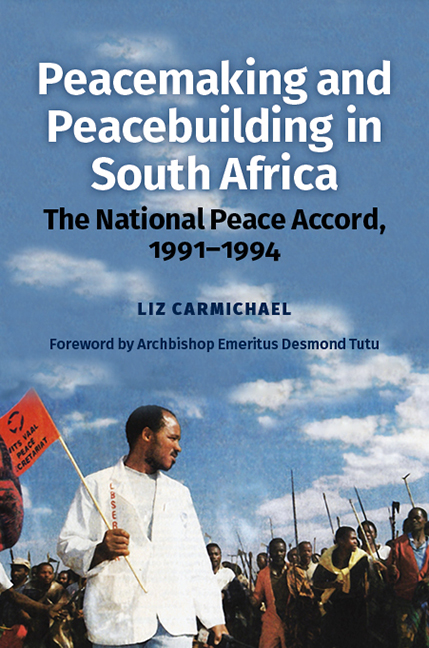Book contents
- Frontmatter
- Dedication
- Contents
- List of Illustrations
- List of Abbreviations
- Glossary
- Acknowledgements
- Note on Nomenclature
- Transition Timeline
- Foreword
- Introduction
- Part One Peacemaking, Peacebuilding, and the South African Conflict
- Part Two Peacemaking
- Part Three Peacebuilding
- Conclusion: Impact and Unfinished Business
- Bibliography
- Index
18 - The Goldstone Commission: Seeking Truth, Recommending Peace
Published online by Cambridge University Press: 08 October 2022
- Frontmatter
- Dedication
- Contents
- List of Illustrations
- List of Abbreviations
- Glossary
- Acknowledgements
- Note on Nomenclature
- Transition Timeline
- Foreword
- Introduction
- Part One Peacemaking, Peacebuilding, and the South African Conflict
- Part Two Peacemaking
- Part Three Peacebuilding
- Conclusion: Impact and Unfinished Business
- Bibliography
- Index
Summary
Introduction
In its ultimatum to the State President on 5 April 1991 the ANC demanded a Commission to inquire into security force behaviour. De Klerk's reaction was to promise a Commission to inquire into all violence. The ANC rejected this initiative, but the President's Act creating a standing Commission of Inquiry Regarding the Prevention of Public Violence and Intimidation came into force on 17 July 1991. The Commission would certainly not have been able to function unless it enjoyed wide legitimacy. It acquired that legitimacy through being adopted into the National Peace Accord.
Chapter 6 incorporates the Act, mostly verbatim, with an added emphasis on impartiality, and the Commission became the main instrument, under the NPA, ‘to investigate and expose the background and reasons for violence, thereby reducing the incidence of violence and intimidation’ (NPA 6.3). Its purpose was not retributive, but to establish facts and make recommendations to prevent recurrences. In its restorative ethos it was a precursor to the TRC, whose hearings it to some degree foreshadowed. With the NPC and NPS the Commission completed a triad of major national-level peace structures.
The Commission was a permanent structure, consisting of five persons each appointed for three years: a judge or senior advocate as Chair, assisted by a senior lawyer or law professor and three other ‘duly qualified’ members. It was initially suggested that the ‘main’ parties might each nominate one of these three members, but it was finally agreed that the National Peace Committee would present a shortlist, for choice and appointment by the State President. This conferred the final seal of legitimacy:
The parties agree that for the Commission to be effective it needs to be a credible instrument. It will furthermore only obtain credibility if it is to be constituted after the National Peace Committee has been consulted. If this condition is met, the establishment of the Commission should be given unconditional support. (6.29)
The Commission's task was to ‘inquire into the phenomenon of public violence and intimidation’, its ‘nature and causes’ and ‘what persons are involved therein’ (6.6.1), and make recommendations to prevent violence.
- Type
- Chapter
- Information
- Peacemaking and Peacebuilding in South AfricaThe National Peace Accord, 1991-1994, pp. 402 - 423Publisher: Boydell & BrewerPrint publication year: 2022



